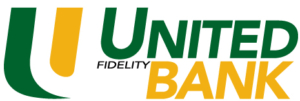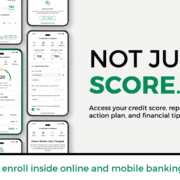Not Just a Score!
April is Financial Literacy Month. At United Fidelity Bank, we believe that knowledge and understanding is the key to unlocking financial success. Understanding your credit is part of financial literacy and wellness. That is why we offer our customers Credit Score.
Your credit score is an essential factor in your finances, and many variables go into calculating this three-digit score. Located right within our online and mobile banking, you have the tools to understand how your credit score is calculated. Knowing what gets calculated and how will help you understand how to keep your credit score healthy in making the best decisions.
Do you have financial goals? Do you want to improve your credit score to achieve those goals? In Credit Score, you can create personalized Credit Goals. By selecting your desired credit score and a timeframe in which you want to achieve that goal, you will see recommendations and progress tracking to get you where you want to be.
More Than Just a Score
Our Credit Score tool goes beyond simply displaying your score. It provides you with a comprehensive suite of resources to manage and monitor your credit effectively:
- Personalized Credit Report: Gain a detailed understanding of your credit history.
- Real-time Credit Monitoring Alerts: Stay informed about any changes to your credit report.
- Credit Score Simulator: Explore how different financial decisions may impact your score.
- Credit Score Education: Access valuable resources to enhance your credit knowledge.
- And More!
Free, Secure, and Convenient
The best part? Our Credit Score tool is completely FREE. You can check and refresh your credit score and credit report daily without worrying about negatively impacting your score. This allows you to stay on top of your credit health and make informed financial decisions with confidence.
Your Partner in Financial Literacy
We’re committed to supporting you on your financial literacy and wellness journey. Our Credit Score tool is designed to empower you with the knowledge and resources you need to achieve your financial goals.
Ready to Take Control of Your Credit?
Learn more about our Credit Score tool and start your journey towards financial empowerment today!
www.unitedfidelity.com/credit-score
Need Assistance?
If you require assistance logging in or setting up the mobile app or online banking, please don’t hesitate to call us at 1-800-280-8280. We’re here to help you every step of the way.
The holidays are over, the decorations are packed away, and a fresh start awaits! It’s time to take a good, hard look at your finances and see where you stand. Think of it as a financial spring cleaning – a time to declutter your spending habits, identify areas for improvement, and set yourself up for a prosperous year ahead.
Let’s begin with a thorough financial checkup. Start by reviewing your bank statements. Did you spot any unauthorized transactions, recurring charges you may have forgotten about (like that monthly subscription box you barely use), or any suspicious activity? Consider consolidating multiple accounts into one to simplify your financial life and potentially earn higher interest rates. Don’t hesitate to contact your bank immediately if you notice anything unusual.
Next, let’s scrutinize your credit card statements. Analyze your spending habits. Are you dining out too often? Indulging in too much online shopping? Now’s the time to identify those spending leaks and adjust. Pay off high-interest balances promptly to avoid accumulating unnecessary debt and the burden of hefty interest charges. Contact your credit card issuer to explore balance transfer options or negotiate a lower interest rate.
Now, let’s turn our attention to your investments. Look at how your investments are performing. Are they keeping pace with your goals? Consider rebalancing your portfolio to ensure it aligns with your risk tolerance and long-term financial objectives. Diversify your investments across different asset classes to mitigate risk. Don’t forget about tax-loss harvesting – if you’ve experienced any investment losses, you might be able to use those losses to offset capital gains from other investments. A financial advisor can help you navigate this and make sure your investment strategy is on track.
Don’t forget to review your retirement accounts. Are you contributing the maximum amount allowed to your 401(k)? If your employer offers an employer match, you’re essentially leaving free money on the table! Explore options like contributing to a Traditional IRA (tax-deductible contributions, but you’ll pay taxes on withdrawals) or a Roth IRA (contributions are made with after-tax dollars, but qualified withdrawals are tax-free). A financial advisor can help you determine the best option for your individual circumstances and tax situation.
Plan for the Future by Setting Goals and Creating a Budget
Now, let’s shift our focus to the future and set some exciting financial goals. What are you dreaming of achieving this year? Saving for a down payment on a home? Funding an epic travel adventure? Planning for your child’s education?
Set specific, achievable, and realistic goals. Instead of simply saying “save more money,” aim for something concrete like “Save $5,000 for a down payment on a house by the end of the year.”
Now, let’s create a budget that works for you. Experiment with different budgeting methods:
- The 50/30/20 Rule: Allocate 50% of your income to needs (rent, utilities, groceries), 30% to wants (entertainment, dining out), and 20% to savings and debt repayment.
- Zero-Based Budgeting: Assign a specific purpose to every dollar of your income. This method helps you become more mindful of your spending and avoid unnecessary expenses.
- Envelope Budgeting: Use physical envelopes to allocate cash for specific categories. This can help you stay on track with your budget and avoid overspending.
Making Your Money Work for You
Now it’s time to act! Prioritize paying off debt. Consider the debt avalanche method (tackle the highest interest debt first) or the debt snowball method (pay off the smallest debt first to gain momentum and build confidence). Explore debt consolidation options to simplify your debt management.
Maximize your retirement contributions. Contribute the maximum amount allowed to your 401(k) and take advantage of any employer match. Explore options like contributing to a Traditional IRA or Roth IRA.
Don’t forget about tax planning strategies. Explore tax-loss harvesting to offset capital gains. Consult with a tax advisor to identify deductions, credits, and other strategies to minimize your tax liability.
Additional Tips for a Successful Financial Year:
- Automate your finances: Set up automatic payments for bills and transfers to your savings account to streamline your financial life and ensure consistent savings.
- Review your insurance coverage: Ensure you have adequate coverage for your home, auto, health, and life insurance needs.
- Seek Professional Advice: Consider consulting with a financial advisor to create a personalized financial plan. A financial advisor can help you with budgeting, investing, retirement planning, and other financial matters.
- Stay Informed: Stay up to date on financial news and trends by reading financial publications, following financial experts on social media, and attending financial seminars.
- Practice Mindfulness: Mindfulness techniques can help you make more conscious and less impulsive financial decisions.
By taking these steps and implementing these strategies, you can set yourself up for a successful financial future. Remember, small steps can lead to big results.
Taking control of your finances is crucial at every stage of life. Whether you’re saving for a down payment, planning for retirement, or simply striving for greater financial peace of mind, understanding your spending habits, and creating a budget are essential steps.
1. Understanding Your Spending
Before you can effectively manage your money, you need to understand where it’s going. This involves a thorough analysis of your spending patterns.
- Track Every Dollar: Utilize your bank’s online and mobile banking tools. Analyze your transaction history carefully. Identify recurring expenses, impulse purchases, and any “money drains” – those sneaky expenses that consistently chip away at your budget.
- Categorize Your Spending: Divide your expenses into specific categories like housing, transportation, food, entertainment, healthcare, education, childcare, savings, and debt repayment. This granular breakdown will reveal spending patterns you might not have noticed.
- Identify Areas for Improvement: Analyze your spending patterns to identify areas where you can cut back. Can you reduce dining out expenses? Can you negotiate lower rates for your utilities? Can you explore more affordable entertainment options?
- The “Needs vs. Wants” Analysis: Before making any purchase, ask yourself:
- Do I need this? (Distinguish between essential needs and discretionary wants.)
- Can I afford this? (Consider the impact on your overall budget and financial goals.)
- Will this bring me long-term value? (Avoid impulsive purchases that offer little lasting benefit.)
2. Building a Budget That Works for You
Creating a budget is a key step in taking control of your finances. A well-defined budget provides a framework for making conscious financial decisions and helps you stay on track towards your financial goals.
- Calculate Your Net Income: Determine your net income (take-home pay) after taxes and other deductions.
- Set Clear Financial Goals:
- Define your long-term goals: Retirement, homeownership, travel, education – what matters most to you?
- Set SMART goals:
- Specific: “Save $20,000 for a down payment on a home.”
- Measurable: “Contribute $500 per month to my retirement account.”
- Achievable: Set realistic and attainable goals.
- Relevant: Ensure your goals align with your values and aspirations.
- Time-bound: Set deadlines for your savings goals (e.g., “Save $20,000 within the next two years”).
- Create a Realistic Budget:
- Explore Budgeting Methodologies:
- The 50/30/20 Rule: A common guideline suggests allocating 50% of your income towards needs (housing, utilities, groceries, transportation), 30% towards wants (entertainment, dining out, hobbies, travel), and 20% towards savings and debt repayment. However, this is a guideline. Adjust it based on your individual needs and income.
- The Zero-Based Budgeting Method: Allocate every dollar of your income to a specific category, ensuring that all income is accounted for.
- Utilize Budgeting Tools:
- Budgeting Apps: Explore user-friendly budgeting apps like Mint, Personal Capital, or YNAB (You Need A Budget) to track spending, create budgets, and set financial goals.
- Spreadsheets: Utilize spreadsheets (like Excel or Google Sheets) to manually track your income and expenses, create custom budgets, and visualize your financial progress.
- Explore Budgeting Methodologies:
3. Build an Emergency Fund
Building an Emergency Fund provides a safety net for unexpected expenses, such as medical bills, car repairs, or job loss.
- Aim for 3-6 Months of Living Expenses: Ideally, your emergency fund should cover 3-6 months of living expenses.
- Start Small and Gradually Increase: Begin with a small amount and gradually increase your contributions over time.
- Utilize High-Yield Savings Accounts: Consider a high-yield savings account to maximize your returns on your emergency fund.
- Treat Your Emergency Fund as Untouchable: Avoid dipping into your emergency fund for non-essential expenses.
4. Maximizing Your Savings & Investments
Saving and investing are important for building long-term financial security.
- Open a High-Yield Savings Account: Maximize your savings by choosing a high-yield savings account with competitive interest rates.
- Explore Certificates of Deposit (CDs): Consider CDs for longer-term savings goals, as they typically offer higher interest rates than regular savings accounts.
- Contribute to Retirement Accounts
- Maximize 401(k) Contributions: Take full advantage of employer-sponsored 401(k) plans, including any employer match.
- Consider an IRA: Open and contribute to a Traditional or Roth IRA to supplement your retirement savings.
- Work with a Financial Advisor: Consult with a qualified financial advisor to develop a personalized investment strategy.
5. Managing Debt Wisely
Managing debt effectively is essential for long-term financial well-being.
- Prioritize High-Interest Debt: Aggressively pay down high-interest debt, such as credit card debt.
- Explore Debt Consolidation Options: Consider consolidating high-interest debt into a lower-interest loan, such as a personal loan or balance transfer credit card.
- Maintain a Good Credit Score: Your credit score plays a vital role in your financial health. Monitor your credit report regularly and take steps to improve your credit score.
6. Utilize Your Bank’s Online and Mobile Banking Tools:
Your bank can be a valuable resource in your financial journey. Take advantage of your bank’s online and mobile banking tools to help you stay on track.
- Online Bill Pay: Schedule and track bill payments online, saving time and reducing the risk of late fees.
- Mobile Check Deposit: Deposit checks quickly and securely using your smartphone.
- Budgeting Tools: Utilize built-in budgeting tools to track spending, set savings goals, and create spending limits.
- Financial Calculators: Explore tools like retirement calculators, loan calculators, and savings calculators to help you make informed financial decisions.
7. Building a Strong Financial Foundation
Building a strong financial foundation is an ongoing process.
- Review and Adjust Regularly: Regularly review your budget and adjust as needed to reflect changes in your income, expenses, and financial goals.
- Stay Informed: Stay updated on financial news and trends. Read articles, attend financial seminars, and utilize online resources.
- Educate Yourself Continuously: Continuously learn about personal finance through books, articles, and online resources.
Building a strong financial foundation is an ongoing journey. By embracing these principles, you can budget effectively to gain control of your finances, achieve your financial goals, and build a secure future.
Managing your money shouldn’t come with unnecessary costs or complications. That’s why United Fidelity Bank’s surcharge-free ATM network is changing the game for personal and business banking customers. Whether withdrawing cash for everyday purchases or accessing funds for your business operations, you don’t have to worry about fees eating into your budget.
Ready to find out why you should utilize United Fidelity Bank’s Surcharge-Free ATM Network? Let’s dive into the benefits, features, and everything you need to know.
Why ATM Fees Are a Drain on Your Finances
ATM fees might seem small at first, but they add up quickly. If you’re constantly withdrawing cash from out-of-network ATMs, you could be losing hundreds of dollars every year—money that could be growing in your savings account or paying down your mortgage.
These fees can also impact small businesses eating into operational budgets and reducing profitability.
United Fidelity Bank’s surcharge-free ATM network helps you avoid these costs entirely, leaving more money for your goals, whether funding your next vacation or expanding your business.
What Sets United Fidelity Bank’s Surcharge-Free ATM Network Apart?
United Fidelity Bank’s surcharge-free ATM network is designed to offer unmatched convenience, transparency, and versatility for both personal and business banking needs.
- Comprehensive Coverage Nationwide – United Fidelity Bank partners with nationwide ATM networks to provide access to over 93,000 ATM locations nationwide. Whether you’re searching for an “ATM near me” or need one while traveling, you’ll find convenient, surcharge-free options.
- Personal and Business-Friendly Services – We cater to everyone, from personal banking customers who need easy access to cash, to business banking customers with frequent withdrawals or other financial transactions.
How the Surcharge-Free ATM Network Benefits Your Personal Banking Needs
United Fidelity Bank’s Surcharge-Free ATM network makes personal banking more affordable, convenient, and tailored to your lifestyle by saving on fees and offering easy access to your cash.
- Save on Fees – Every dollar saved on ATM fees is another dollar you can put toward your goals, like building an emergency fund in your savings account or paying off your credit card faster.
- Convenience at Your Fingertips – From everyday errands to weekend getaways, you can count on United Fidelity Bank’s ATM locator tool to find nearby surcharge-free ATMs wherever you go.
- Banking for Every Lifestyle – Our surcharge-free ATM network fits seamlessly into your routine.
Digital Banking and Mobile App Integration
It is important to have tools to manage your finances easily and effectively. United Fidelity Bank’s mobile app pairs perfectly with the surcharge-free ATM network, offering features like:
- ATM Locator Tool: Find surcharge-free ATMs near you with just a few taps.
- Real-Time Notifications: Get instant alerts for withdrawals and account updates.
- Card Management: Lock and unlock your card or set withdrawal limits for added security.
- Account Insights: Track spending, monitor balances, and set savings goals from your phone.
Making the Switch to United Fidelity Bank
Switching to United Fidelity Bank is a simple and rewarding process that ensures a smarter banking experience. Whether you’re managing personal finances or running a business, the bank’s tailored solutions and surcharge-free ATM network make it easy to take control of your money in just a few steps.
- Step 1: Open an Account – If you are looking for a savings account, a Certificate of Deposit (CD), a checking account, or a business banking solution, United Fidelity Bank has options tailored to your needs.
- Step 2: Explore the ATM Network – With thousands of ATMs nationwide, accessing your cash is easier than ever. Use the mobile app or visit our website at unitedfidelity.com/atm-locations to locate the nearest machine.
- Step 3: Take Control of Your Finances – Paying bills and withdrawing cash becomes smoother when ATM fees aren’t a concern.
Why Customers Choose United Fidelity Bank
Choosing the right bank is about trust, innovation, and a commitment to meeting your needs. United Fidelity Bank stands out by blending community values with comprehensive banking options and forward-thinking solutions, making it the go-to choice for customers who expect more from their financial institution.
- Community-Driven Approach – As a local bank, United Fidelity Bank focuses on providing exceptional customer service and understanding the unique needs of its community.
- Comprehensive Baking Options – From Certificates of Deposit to high-yield checking accounts, United Fidelity Bank offers a one-stop solution for all your banking needs.
- Innovative Solutions – United Fidelity Bank bridges the gap between modern and classic banking methods by combining the reliability of a traditional local bank with the convenience of digital banking tools.
FAQs
- How do I find an ATM? Use the ATM locator tool on the mobile app or visit unitedfidelity.com/atm-locations to find participating ATMs near you.
- Are there any additional perks for mobile banking users? Absolutely! The mobile app offers real-time account updates, budget tracking, and secure card management features.
United Fidelity Bank’s surcharge-free ATM network isn’t just a feature—it’s a commitment to putting customers first.
Take Charge of Your Financial Health with United Fidelity Bank’s Credit Score Service
Managing your credit score is one of the most important steps to securing your financial future. A good credit score doesn’t just mean access to loans and credit cards; it can also open doors to better interest rates, rental approvals, and career opportunities. At United Fidelity Bank, we understand the importance of credit health, which is why we offer our innovative Credit Score Service.
Additionally, knowing how to improve and maintain your score with practical strategies can make all the difference in achieving your goals. Let’s explore what makes credit scores so impactful, the benefits of United Fidelity Bank’s service, and some proven tips to enhance your financial health.
What is a Credit Score and Why Does It Matter?
A credit score is a three-digit number that represents your creditworthiness. Ranging from 300 to 850, this number gives lenders a snapshot of how responsibly you handle credit. A higher score reflects a strong history of managing debt, while a lower score may indicate potential risk to lenders.
Think of your credit score as your financial report card. It’s calculated based on your borrowing and repayment behavior and influences how much you can borrow and at what interest rates. A good score can save you thousands of dollars in interest over time.
Key Factors That Affect Your Credit Score
Understanding how your credit score is determined is the first step to improving it. The main factors include:
- Payment History: Your payment history accounts for 35% of your credit score. Paying bills on time is crucial as late payments can significantly hurt your score.
- Credit Utilization Ratio: This is the percentage of your available credit that you’re using. For instance, if you have a credit limit of $10,000 and a balance of $3,000, your utilization ratio is 30%. Experts recommend keeping this below 30%.
- Length of Credit History: The longer your accounts have been active, the better. This shows lenders that you’ve managed credit responsibly over time.
- Credit Mix: Lenders like to see a variety of credit types, such as credit cards, mortgages, and auto loans. Having a balanced mix can boost your score.
- New Credit Inquiries: Each time you apply for credit, it can slightly lower your score. Try to limit applications to avoid unnecessary hits.
Why Your Credit Score Impacts Major Life Decisions
- Homeownership
- Dreaming of buying a home? Your credit score will play a key role in determining your mortgage eligibility. A higher score can help you secure a lower interest rate, reducing your monthly payments and saving you money in the long run.
- Loan Approval and Interest Rates
- Whether it’s a personal loan for a wedding or an auto loan for your next car, lenders use your credit score to decide the terms of your loan. Borrowers with good scores often enjoy lower interest rates and more favorable repayment options.
- Renting or Leasing
- Many landlords check credit scores as part of the tenant screening process. A good score can make the rental process smoother, while a poor score might lead to higher security deposits or application rejections.
- Employment Opportunities
- Employers may review your credit history as part of the hiring process. A good credit score reflects financial responsibility, which can appeal to potential employers.
The Exclusive Benefits of United Fidelity Bank’s Credit Score Service
At United Fidelity Bank, we’re committed to helping you achieve your financial goals. That’s why our Credit Score Service is designed with tools and resources to empower you on your journey to better credit.
- Daily Credit Score Updates
- Knowing where you stand is half the battle. Our service provides daily updates to your credit score, allowing you to monitor your progress. Regular monitoring helps you spot inaccuracies and identify trends, so you can adjust as needed.
- Real-Time Credit Monitoring Alerts
- Identity theft and fraudulent activities are real threats to your financial health. With our real-time monitoring, you’ll receive alerts for suspicious changes to your credit report. This early detection allows you to take immediate action to protect your credit.
- Personalized Financial Health Checkup
- United Fidelity Bank is here to guide you every step of the way. Whether you’re trying to reduce debt or understand how to improve your score, we can suggest strategies and actionable advice tailored to your unique needs.
- Credit Score Simulator
- Have you ever wondered how opening a new credit card or paying off a loan might affect your score? Our Credit Score Simulator allows you to test different scenarios and predict their impact on your credit health. This tool helps you make smarter financial decisions.
Six Tips for Improving Your Credit Score
Good habits are essential for building and maintaining a strong credit score. Here are six practical strategies to help you improve your credit:
- Review Your Credit Reports – Start by checking your credit reports for accuracy. Errors such as incorrect payment histories or fraudulent accounts can hurt your score. You’re entitled to one free credit report annually from the three major bureaus—TransUnion, Equifax, and Experian.
- Pay Bills on Time – This is the single most important factor in your credit score. Set up reminders or enroll in automatic payments to avoid missing due dates. Even one late payment can have a significant impact.
- Manage Credit Card Balances – Keeping your credit utilization ratio low is key to a healthy score. If you’re carrying high balances, create a plan to pay them down. Remember, using less than 30% of your credit limit is ideal.
- Maintain Long-Standing Accounts – Length of credit history matters, so think twice before closing old credit accounts. Even if you don’t use a card very often, keeping the account open can help your score.
- Be Cautious with New Credit Applications – While applying for new credit is sometimes necessary, avoid doing it too often. Each application results in a hard inquiry, which can slightly lower your score. Space out applications to minimize the impact.
- Diversify Your Credit Mix – If possible, balance your credit profile with a mix of credit types. For example, responsibly managing a credit card and an auto loan shows lenders that you can handle different financial obligations.
Step-by-Step Guide to Enrolling in United Fidelity Bank’s Credit Score Service
Getting started with our Credit Score Service is simple:
- Log in to Your Online Banking Account: Access your account through our website or mobile app.
- Find the Credit Score Section: Locate the “Credit Score” tab on your dashboard.
- Complete the Enrollment Process: Follow the prompts, review the terms, and provide necessary details, such as your Social Security number.
- Start Monitoring: Once enrolled, you’ll gain access to all the tools and features designed to improve your credit health.
Frequently Asked Questions About Credit Scores
- What is a good credit score? Generally, a score above 700 is considered good, with excellent scores starting at 750 or higher.
- Does checking my credit score lower it? No, using tools like United Fidelity Bank’s service allows for soft inquiries, which don’t affect your score.
- How often should I check my credit score? Regular monitoring is key. With daily updates available, staying informed has never been easier.
- How long does it take to improve a credit score? Results vary, but consistent good habits can show improvements within a few months.
- Can I dispute errors on my credit report? Yes, and you should. Disputing inaccuracies can help restore your credit health.
Start Building Your Financial Future Today
United Fidelity Bank’s Credit Score Service gives you the tools, insights, and support needed to take charge of your credit health. From daily updates to personalized advice, our goal is to empower you to make smarter financial decisions. Enroll today and begin your journey toward a brighter financial future.
The holidays are a time of joy, giving, and celebration. But let’s be honest—managing finances this season can be overwhelming. From buying gifts and hosting parties to traveling and preparing holiday meals, it’s easy for your budget to spiral out of control. But here’s the good news: with a little planning and the tools available from United Fidelity Bank, you can enjoy a festive, stress-free holiday season without breaking the bank.
Let’s explore practical tips for managing your finances while still embracing the magic of the holidays.
Setting a Realistic Holiday Budget
A holiday budget is your foundation for financial success during this busy season. Without it, expenses can quickly pile up, leaving you feeling stressed and unprepared.
Identify All Income Sources and Fixed Expenses
Start by knowing exactly how much money you have to work with. Include your regular paycheck, seasonal bonuses, freelance gigs, and even side hustles. Every dollar counts! Don’t forget your monthly bills like rent, utilities, and insurance. Subtract these essentials from your total income to see how much is left for holiday expenses.
Allocate Funds for Holiday Costs
Set a specific amount for gifts, food, travel, and decorations. Remember, staying within your budget doesn’t mean cutting out the fun—it just means being intentional.
Pro Tip: Use United Fidelity Bank’s mobile app to track your spending in real-time. This ensures you stick to your budget while keeping the season enjoyable.
Crafting a Holiday Spending Plan
A well-thought-out plan goes hand in hand with your budget. Let’s break it down step by step:
Create a Gift List with Spending Limits and Plan for Non-Gift Expenses
List everyone you plan to shop for and set a spending cap for each person. This ensures you avoid last-minute splurges. Holiday meals, travel, and decorations can add up. Budget for these extras to avoid surprises later.
Consider DIY Gifts and Stay Committed to Your Plan
Handmade presents like baked goods, photo albums, or crafts can be incredibly meaningful and budget friendly. Once you’ve set your limits, stick to them. Challenge yourself to find creative ways to give within your means.
Smart Shopping Strategies
Savvy shopping can save you time, money, and stress during the holidays. Here’s how:
Make a Detailed Shopping List and Shop for Deals
Impulse buying is one of the easiest ways to overspend.
- Write down exactly what you need to buy and focus only on those items.
- Take advantage of online comparison tools, flash sales, and exclusive discounts. Shopping from home can also help you avoid the temptation of in-store browsing.
- Check out thrift stores, resale platforms, or post-holiday sales. You’d be surprised at the quality finds and savings available.
Utilize Black Friday, Small Business Saturday, Cyber Monday and Pre-Holiday Sales
Plan your big-ticket purchases during major sale events. It’s one of the best ways to snag great deals.
Hosting Affordable Holiday Meals
Holiday feasts are a big part of the season, but they don’t have to break the bank. These tips can help you serve up festive meals without overspending.
Plan a Budget-Friendly Menu
Stick to seasonal ingredients like root vegetables or winter fruits—they’re often cheaper and just as delicious. Avoid splurging on expensive, out-of-season items.
Batch Cook and Shop in Bulk to Save Time and Money
Prepare dishes in large quantities and freeze portions for later. It reduces last-minute cooking stress and helps you stretch your budget. Buy ingredients in bulk to take advantage of lower prices. Look for sales at warehouse stores or your local grocery store.
Host a Potluck and Repurpose Leftovers
Invite guests to contribute a dish. Not only does it reduce your workload, but it also creates a shared experience everyone will enjoy. Get creative with leftovers by making soups, casseroles, or sandwiches. It’s an easy way to extend the life of your holiday feast.
Travel Tips to Save During the Holidays
Travel can be one of the biggest expenses of the season. Here’s how to keep costs down:
Book Early and Be Flexible with Dates
The sooner you lock in flights and hotel reservations, the better. Prices tend to climb as the holidays approach. Traveling midweek or during off-peak hours can significantly cut costs. Try adjusting your plans to save on flights or accommodations.
Pack Light and Consider Alternative Transportation
Avoid checked baggage fees by packing efficiently. A carry-on bag is often enough for short trips. For shorter distances, buses or trains are often more affordable and convenient than flying.
Maintaining Financial Wellness
Financial health is just as important as your holiday plans. Let’s explore ways to stay on top of your finances while enjoying the season.
Practice Self-Care and Set Limits
Don’t let holiday stress affect your well-being. Take breaks, stay active, and focus on the joy of the season. It’s okay to say no to extravagant events or gift exchanges if they strain your budget. Remember, the holidays are about connection, not competition.
Avoid Holiday Debt and Seek Financial Advice
Stick to cash or debit for purchases to avoid piling up credit card debt. If you do use a credit card, aim to pay off the balance in full each month. Ask yourself, “Do I really need this?” before making a purchase. Small moments of mindfulness can save you big in the long run.
The holidays should be a time for making memories, not stressing over finances. By creating a budget and shopping smartly, you can have a joyful, stress-free holiday season. Remember, it’s not about how much you spend—it’s about the love, laughter, and connections you share.
What is a High-Yield Checking Account?
Similar to a standard interest-bearing checking account, a high yield checking account allows you to earn a higher annual percentage yield (APY) therefore, ensuring that you earn more interest on the money in your account. According to the Federal Deposit Insurance Corp. (FDIC), in November 2023 a standard checking account earned 0.07% APY on average, while a high-yield checking account can earn upwards of 3.00%.
The biggest difference between standard and high-yield checking accounts are the criteria needed to qualify. For example, you may need to meet a certain number of debit card transactions per month, enroll in e-statements, or maintain a certain balance. Once all the monthly criteria are met, you then receive the APY associated with your account.
How does my account earn interest?
A high-yield checking account earns interest each statement period. However, if you did not meet the criteria for the month, the percentage you receive may be different.
What makes Elevate Checking different from other high-yield accounts?
With most high-yield checking accounts, all of the requirements must be met before earning interest. However, with Elevate Checking there’s more than one way to qualify. Earn interest by making six debit card purchases per month. Boost your rate by meeting any of these additional monthly qualifications: use online or mobile banking, receive eStatements, have monthly direct deposits of at least $500, maintain minimum daily balance of $1,000 in a United Fidelity Bank personal savings or money market account.
Each of our monthly qualifications is worth a certain percentage in interest. Therefore, the more criteria you meet, the more interest you earn, with the potential to earn 4.00% APY.
Contact your local banker to learn more about our Elevate Checking Account today.
Annual Percentage Yield (APY) is accurate as of 08/01/2024. The APY range calculation is based on an assumed account balance cap of $30,000. The APY decreases as your balance increases above $30,000. Must meet certain criteria to qualify. When the Elevate Checking eligibility requirement and additional options are met, the interest rate on your account and corresponding annual percentage yield (APY) will vary based on the current applicable rates and tiers. When the Elevate Checking eligibility requirement is not met, the account will not earn interest. To obtain 4.00% APY you must complete a minimum of six (6) posted and cleared debit card Point-of-Sale (POS) purchases, access online or mobile banking, enroll and receive eStatements, ACH Direct Deposit(s) of at least $500.00, maintain a minimum daily balance of $1,000.00 in a United Fidelity Bank personal savings or money market account. Eligibility requirements must be in place and activity requirements must post and clear the account each statement cycle to receive the interest rate and APY of applicable rate tier. Rates and APY for each tier may change at any time without notice after the account is opened. Fees or other conditions could reduce earnings on the account. Minimum of $25 to open an account. Monthly service fee of $5 if balance drops below $500 any day during the statement cycle. Paper statement fee of $5 if eStatements are not utilized. Program rates, terms, and conditions are subject to change without notice.














